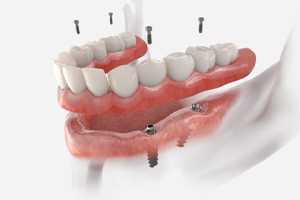Dental Implant Dentures—Worcester, MA
Teeth You Can Trust for a Lifetime

Are you tired of having to work around your missing teeth every day, always having to think twice before you speak, eat, or smile? Ready to upgrade your uncomfortable, unstable denture that causes more problems than it solves? In either situation, dental implant dentures in Worcester, MA from Handsman & Haddad Periodontics can provide the exact solution someone is looking for. With them, a patient can finally get the attractive, strong teeth they desire and never have to worry about them again.
What Are Implant Dentures?

On the surface, an implant denture looks like a typical one you’ve probably seen before, but what matters most lies below the gum line. Rather than just sitting on top of the gums or using clasps around nearby teeth to stay in place, implant dentures are anchored directly to the jawbone with a small number of dental implants. These act like new tooth roots, making the prosthetic extremely stable. There are two main types of implant dentures:
Fixed/Permanent Implant Dentures
With this prosthetic, the patient cannot remove it—it can only be done by their dentist. These better replicate real teeth and allow the patient to practice oral hygiene without having to remove their denture.
Removable Implant Dentures
With this, the denture snaps or clips onto dental implants placed into the jawbone, and the patient can take their teeth out for hygiene purposes. A traditional denture can sometimes be upgraded to a removable implant denture.
The Implant Denture Process

The first step is that a patient has a consultation with their dentist where they discuss their tooth replacement options. If they both decide that an implant denture is the best method, then they will likely be referred to our practice for the implant placement surgery.
This procedure can be completed in one appointment, and afterward, the mouth and jaw will need about three to six months to heal, during which the jawbone will bond with the implants, making them exceptionally strong. The patient will be fitted with a temporary denture while they recover.
Once their mouth is ready, the patient will return to their dentist to have their new, final denture fitted onto the implants.
Am I a Candidate for Implant Dentures?

Basically, anyone who is missing several teeth and could benefit from a denture is a good candidate for an implant denture. The main thing to consider is that a patient’s mouth has to be healthy enough to support the implants, which means it needs to be free of gum disease and other oral infections. The underlying bone must be thick enough as well. If necessary, preparatory treatments can be used to ensure the long-term success of the procedure by getting a patient’s mouth ready.
Benefits of Combining Dentures & Dental Implants

Implant dentures offer several advantages compared to traditional removable prosthetics:
- Implant dentures allow for a much stronger bite force
- Implant dentures are smaller than regular ones, leaving more room for the tongue
- They can be trusted to not slip and slide when someone eats or speaks
- The implants stimulate the jaw and prevent the bone loss that often follows tooth loss
- They help support the skin of the lips and cheeks, leading to a more youthful appearance
- They can often last for decades without needing to be replaced
Implant Denture FAQs
Does Getting Implant Dentures Hurt?
While you may be nervous about having implant posts inserted into your jaw, our team will apply a local anesthetic to your mouth before the treatment begins. We can also use dental sedation to help you enter an advanced state of relaxation during the procedure. As a result, you won’t have to worry about experiencing discomfort during your implant surgery.
Some soreness may occur once the local anesthetic has worn off. However, it shouldn’t be anything that can’t be managed with over-the-counter pain medication. As your mouth heals, your discomfort should start to fade. (If it seems like the pain is getting worse or has persisted longer than it should have, please call our office immediately to let us know what’s going on.)
Can I Get Implant Dentures If I Already Have Regular Ones?
You can still be a candidate for implant dentures even if you are currently wearing traditional dentures. That being said, our team will need to evaluate the current state of your jaw first; if your teeth have been missing for a while, you are likely to have experienced some bone loss, which will need to be corrected before you can receive dental implants.
Upgrading to implant dentures can be beneficial for many reasons. For one thing, you will no longer have to worry about your replacement teeth slipping when you’re trying to chew or speak. On top of that, implant dentures offer better chewing power than traditional ones, which can make it easier to enjoy certain foods. And because the implant posts are inserted into your jaw, they can provide the necessary stimulation to help prevent further bone loss.
How Long Do Implant Dentures Last?
As with any type of tooth replacement, the longevity of implant dentures depends heavily on the care you give them. That being said, it’s not unheard of for implant dentures to last for decades. In comparison, the lifespan of a traditional denture is often around 5 to 7 years. As such, implant dentures are definitely worth considering for patients who want a solution for tooth loss that they can count on to last for a long time.
How Successful are Implant Dentures?
The success rate of implant dentures is as high as 95%. Needless to say, this means that it is considered a very reliable option for replacing entire rows of teeth at once. However, it’s important to be aware of factors that could potentially affect the success of the procedure.
Gum disease is considered a leading cause of dental implant failure, as it can damage the tissues responsible for holding the implant posts in place. Thus, if you have gum disease, you will need to have it treated before you can start the implant denture process. Additionally, once your dental implants have been placed, you will need to be diligent about practicing excellent oral hygiene in order to prevent an infection from occurring around the implant posts.
Can I Get Implant Dentures If I Still Have Some of My Natural Teeth?
Implant dentures are meant as a solution for extensive tooth loss. As such, they are typically recommended for patients who have lost all or most of their teeth in one or both arches. However, it’s always better to save your natural teeth whenever you can. Thus, if there are still plenty of healthy teeth in your mouth, it will likely be better to consider a different tooth replacement option.
During your initial consultation, our team will take a look at your mouth to determine how many teeth need to be replaced. We’ll let you know whether implant dentures are a good fit for you based on your situation. In the event that the teeth you still have aren’t in good enough health to be worth keeping, we may recommend having them extracted to make room for implant dentures.
What is Healing with Implant Dentures Like?
After you receive implant dentures, you will typically need to take two or three days off from work to rest. Plan on only eating soft and liquid foods for a while, and don’t forget that you can take over-the-counter pain relievers such as ibuprofen to manage any discomfort that you may be experiencing.
After about a week, your mouth should start to feel normal again. However, it will take a matter of months for the implant posts to fully fuse with the surrounding jawbone via osseointegration. During this time, you will need to take appropriate measures to ensure that your implant posts stay safe until the osseointegration process is complete.
Does Dental Insurance Cover Implant Dentures?
The coverage available for implant dentures can vary depending on what plan you have. In many cases, your insurance company may not pay for the implant posts, but they could still provide partial coverage for the denture as well as certain preliminary treatments.
Our team can review your dental insurance plan with you and determine whether your benefits can help you lower the out-of-pocket cost of implant dentures. You can count on us to help you get the most out of your policy and file any necessary claims on your behalf.
How Can I Take Care of My Implant Dentures?
Fixed implant dentures can be brushed as if they were natural teeth. Meanwhile, a removable implant denture should be taken out at least twice a day for a thorough cleaning. Don’t forget to visit your regular dentist at least twice a year. They can check on the condition of your implant dentures, and they’ll let you know if there are any small problems that need to be addressed before they put your revitalized smile at risk.

